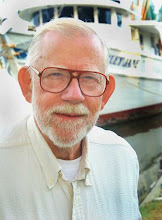Today's article in the New York Times by Thomas Friedman should be alarming.
But don't worry. Oriental's member of Pamlico County's Board of Commissioners reported at the last Board meeting that she and others have successfully blocked an effort by NC planners to push restrictions on construction based on predicted sea rise. The objection: the plan was based on computer modeling. Presumably, we are supposed to wait until the water actually rises. That would be scientific.
Wednesday, June 8, 2011
Wednesday, November 18, 2009
Philosophical Reflections
My favorite contemporary American philosopher is Yogi Berra, who famously observed: "It's difficult to make predictions, especially about the future." He also advised: "when you come to a fork in the road, take it." Good advice.
I believe Yogi also follows the guidance of another American thinker, Popeye, who makes no apologies. "I yam what I yam," he says.
Benjamin Disraeli (not an American) once advised, "never complain, never explain." The same quote is often attributed to Henry Ford. In "She Wore a Yellow Ribbon," John Wayne advises a junior officer, "never apologize. It's a sign of weakness." I think the point of such advice is: "don't make excuses."
Possibly the most important influence on the way I do things comes from my early experience as a licensed umpire. The first thing you learn at umpiring class is: whatever you do, call 'em like you see 'em. Don't let yourself be influenced by the prominence of the player or whether you like him or not. Above all, call each play on its own terms. Don't ever try to make up for a bad call by changing your call on the next play. And keep a copy of the rule book in your hip pocket. No matter how well you know the rules, it never hurts to look it up.
The reason for rules is fairness. By the time I was six years old, I had learned that without rules and someone to enforce them, bullies rule the playground.
I believe Yogi also follows the guidance of another American thinker, Popeye, who makes no apologies. "I yam what I yam," he says.
Benjamin Disraeli (not an American) once advised, "never complain, never explain." The same quote is often attributed to Henry Ford. In "She Wore a Yellow Ribbon," John Wayne advises a junior officer, "never apologize. It's a sign of weakness." I think the point of such advice is: "don't make excuses."
Possibly the most important influence on the way I do things comes from my early experience as a licensed umpire. The first thing you learn at umpiring class is: whatever you do, call 'em like you see 'em. Don't let yourself be influenced by the prominence of the player or whether you like him or not. Above all, call each play on its own terms. Don't ever try to make up for a bad call by changing your call on the next play. And keep a copy of the rule book in your hip pocket. No matter how well you know the rules, it never hurts to look it up.
The reason for rules is fairness. By the time I was six years old, I had learned that without rules and someone to enforce them, bullies rule the playground.
Subscribe to:
Comments (Atom)
